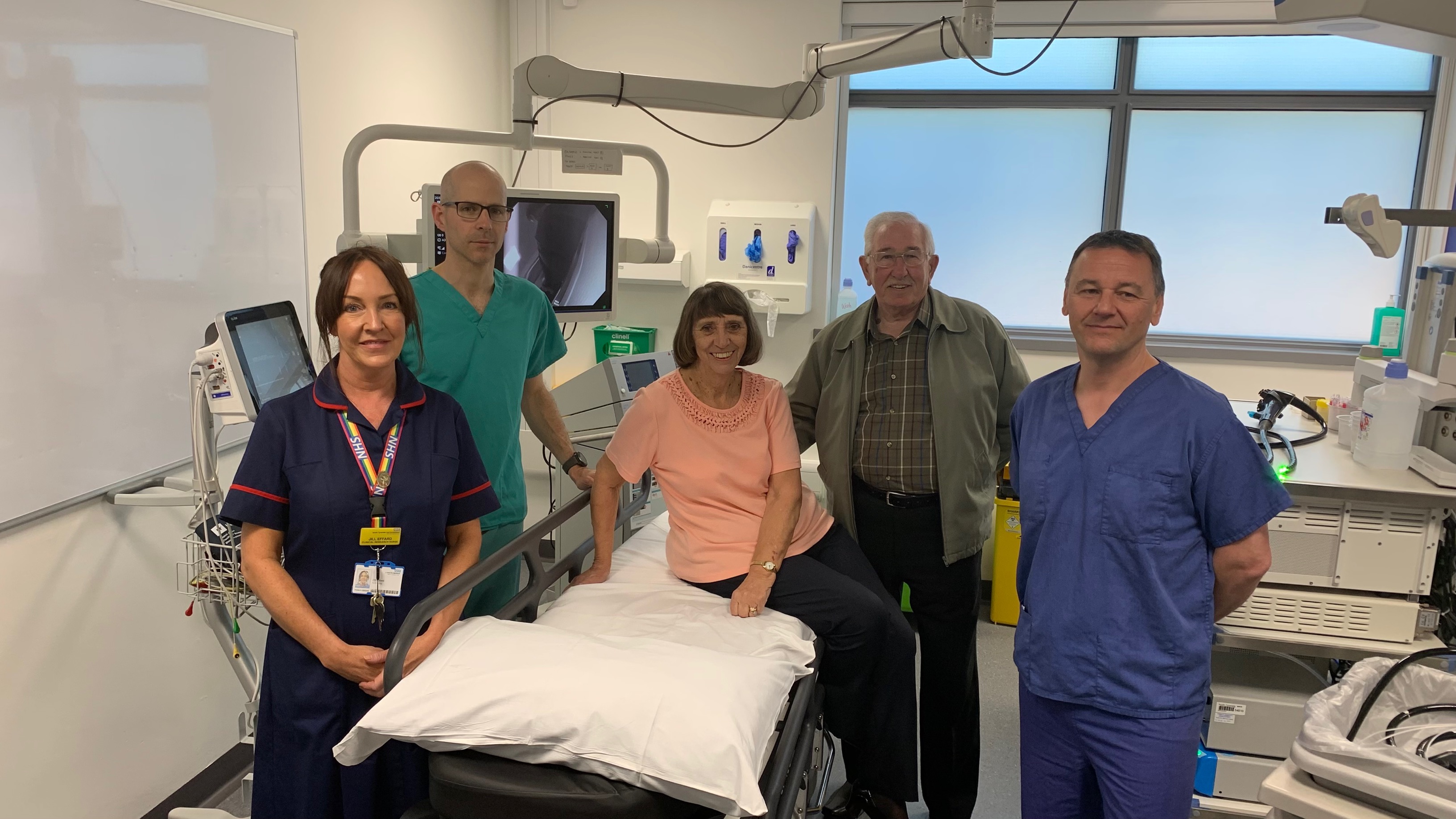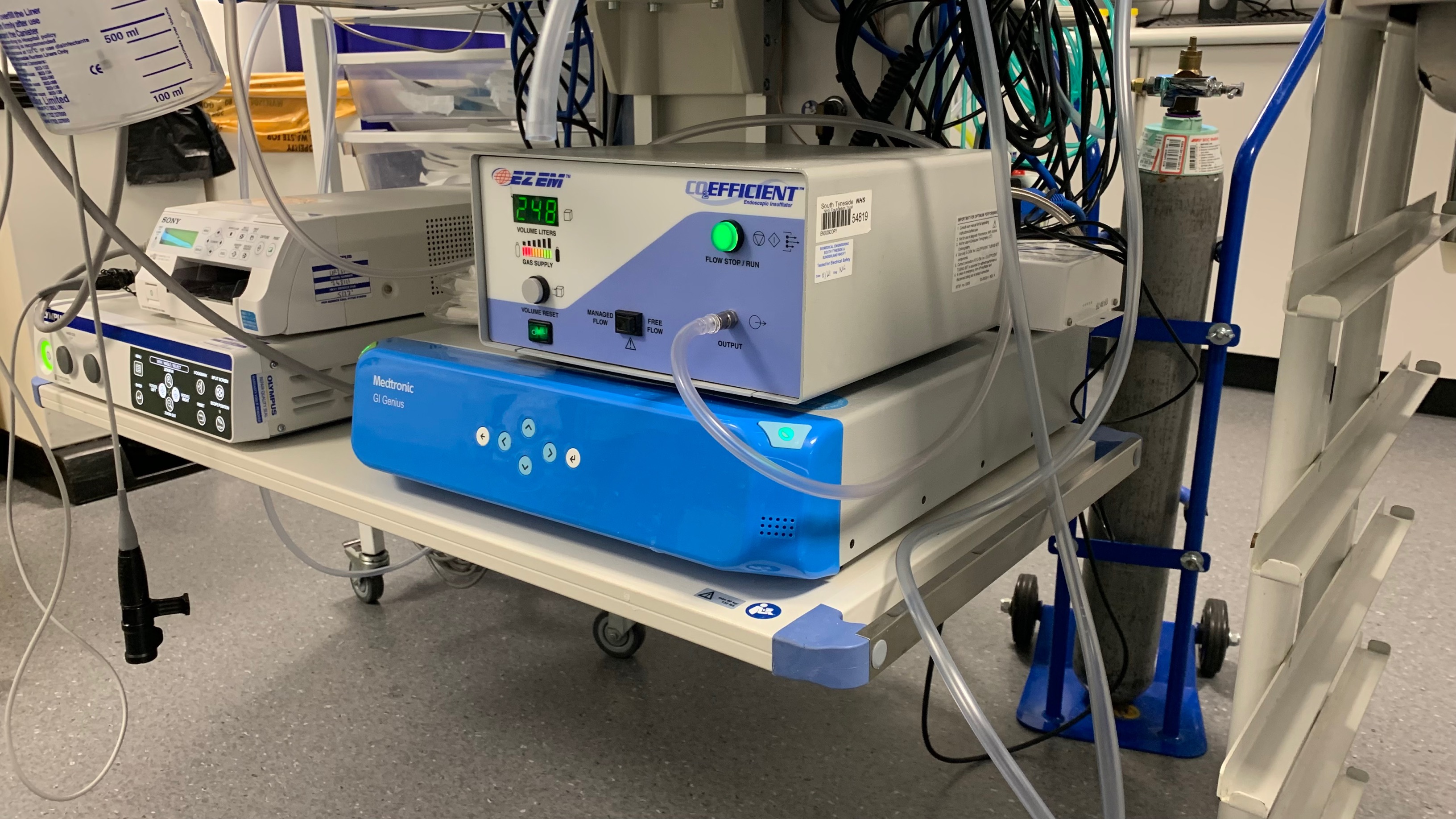Published on: 20 April 2023
A research trial putting Artificial Intelligence to the test has recruited its final patient as the team leading the study now look at how it could help save lives from bowel cancer.
COLO-DETECT is led by South Tyneside and Sunderland NHS Foundation Trust and Newcastle University and has involved nine other Trusts across the country – including four others based in the North East.
It is the largest trial of its kind in the world and used kit called GI Genius.
Created by Medtronic, it is added to colonoscopy equipment already in use in units.
Colonoscopies are used to diagnose cancer and pre-cancerous polyps within the bowel (colon).
Finding and removing these polyps reduces the risk of people getting cancer.
The GI Genius box is activated in a randomised study after patients signed up to the programme.
The Artificial Intelligence technology works by flagging up a green box on the screen if it spots areas of concern – these can often be missed by the human eye.
The team then investigate that area and remove any polyps, growths which can develop into cancer.
COLO-DETECT is part of COLO-SPEED – which stands for Colorectal Cancer Screening Prevention Endoscopy and Early Diagnosis. This brings together sister studies aimed at preventing and diagnosing bowel cancer early.
Bowel cancer is the second biggest killer cancer after lung cancer and claims around 16,800 lives a year, or 46 each day, in the UK.
COLO-DETECT has recruited more than 2,000 patients across 10 Trusts.
This included 574 through the sponsor Trust.
The final patient was recruited to the trial two weeks ago.
Now all the data from each partner trust is being checked, with the eagerly anticipated results expected to be published in the autumn.
Among the patients from South Tyneside and Sunderland NHS Foundation Trust to take part was Jean Tyler, a retired careers advisor from South Shields.

Jean and Derek Tyler with Research Nurse Jill Effard, Research Fellow Dr Alexander Seager and Consultant Prof Colin Rees.
She was invited for a colonoscopy at South Tyneside District Hospital last year after the national bowel screening test for 60 to 74-year-olds sent to her home found blood in her poo.
Her colonoscopy, which was taken as part of the COLO-DETECT study, helped identify five extra polyps.
All of these polyps were confirmed to be non-cancerous, but the procedure did find another area of concern.
She then had a CT scan and key hole surgery, where further polyps were found and were also non-cancerous, but the area of concern was found to be cancer and was removed.
She was then declared clear of the disease and is undergoing follow-ups to monitor her.
The 75-year-old, who is married to Derek, said:
"When they rang me up to make my appointment for my colonoscopy, I was asked if I would like to take part in this research.
"I always say yes to these research projects because I know that they can make things a lot better for everybody.
"The screening test had been sent through and I’d thought ‘I can’t be bothered’. Then four or five days later I realised what it was and I thought I’d better make sure. I’m so glad I did do it. I would say to anyone make sure you do yours too."
Jean added her praise to the team who looked after her throughout her care, including the Trust’s Macmillan team, with special thanks to Daya Singh, her consultant, Jane Barnes and Teresa Liddle, bowel cancer specialist nurses.
"I had fantastic support, it was unbelievable. I had about seven or eight visits last year and I was so well looked after," she added
Jean also thanked her husband Derek for his unwavering support.
Consultant Professor Colin Rees, who is a Professor of Gastroenterology at Newcastle University, has led the COLO-DETECT study alongside a team of colleagues at the Trust.
Prof Rees, who is also President Elect British Society of Gastroenterology, said there are many ways AI could be used to transform medicine as it can analyse details much quicker than people can.
He said:
"AI can be used to look at data, it can be used for things like detection, as in the COLO-DETECT study, for imaging and it's very good at picking up patterns in data or results.
"So AI will be, without question, a major tool used by medicine in the coming years.
"Our research led from Newcastle University and South Tyneside and Sunderland NHS Foundation Trust is world leading.
"COLO-DETECT is part of our broader COLO-SPEED research, which has recruited more than 4,000 patients in addition to the 2,000 in COLO-DETECT, building one of the largest bowel cancer research platforms in the world.
"Our research has a real impact and we tend to publish our research in really high quality journals, so we make sure people see it and then it changes practice improving care for our patients.
"We are grateful to patients like Mrs Tyler who agree to participate in research.
"We know that hospitals that undertake research provide better patient care and without the help of our patients our research would not be possible.
"Whatever we find from COLO-DETECT we will make sure that the message gets out there and hopefully it will show that this improves detection.
"But if it doesn't, that's equally important because what you don't want to do is waste resources on things if they don't help."
Other North East Trusts which have been involved in COLO-DETECT are North Tees and Hartlepool NHS Foundation Trust, South Tees NHS Foundation Trust, Northumbria NHS Foundation Trust and The Newcastle upon Tyne Hospitals NHS Foundation Trust.

The GI Genius box in place in one of the scoping rooms at South Tyneside District Hospital.
COLO-SPEED is backed by the Sir Bobby Robson Foundation, which is part of Newcastle Hospitals Charity, and gifted £985,000 to help set up a platform which used to support all the COLO group of studies.
COLO-SPEED demonstrates the very best of North East collaboration as a partnerships between the NHS and Newcastle University – the University having recently been ranked in the top 10 in the world for Gastroenterology and Hepatology (liver medicine).
For more details, click here and information on the symptoms, treatment and causes of bowel cancer can be found through by clicking here.
Prof Rees and Lead Research Nurse for COLO-SPEED Ingrid Emmerson have recorded an episode of the Trust’s Our People Podcast on the studies.
It and all episodes shared so far can be found by clicking here.
Thank you to other Trusts who have supported COLO-DETECT:
- Bolton NHS Foundation Trust
- Kettering General Hospital NHS Foundation Trust
- North Tees and Hartlepool NHS Foundation Trust
- Northumbria Healthcare NHS Foundation Trust
- South Tees Hospitals NHS Foundation Trust
- Newcastle Upon Tyne Hospitals NHS Foundation Trust
- Royal Wolverhampton NHS Trust
- University Hospitals Sussex NHS Foundation Trust
- University Hospitals Morecambe Bay NHS Foundation Trust







